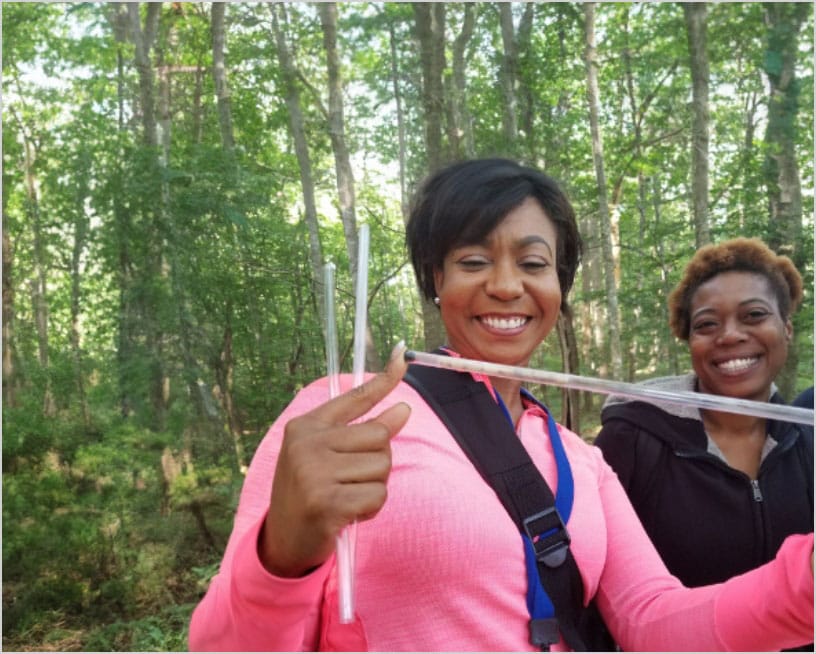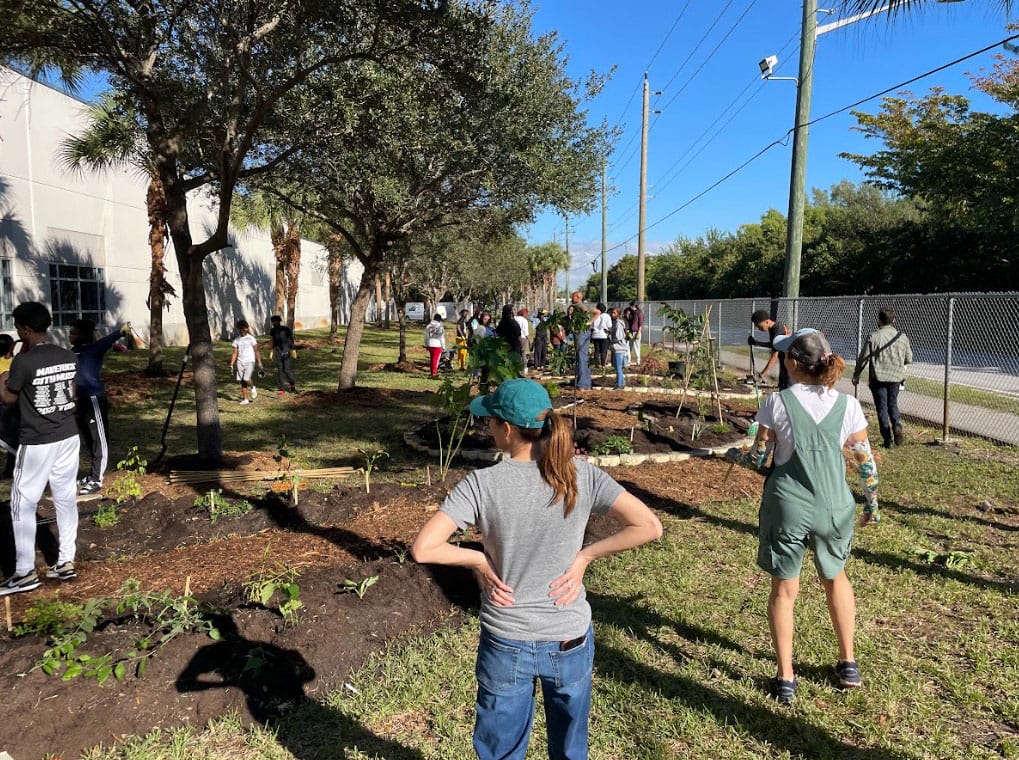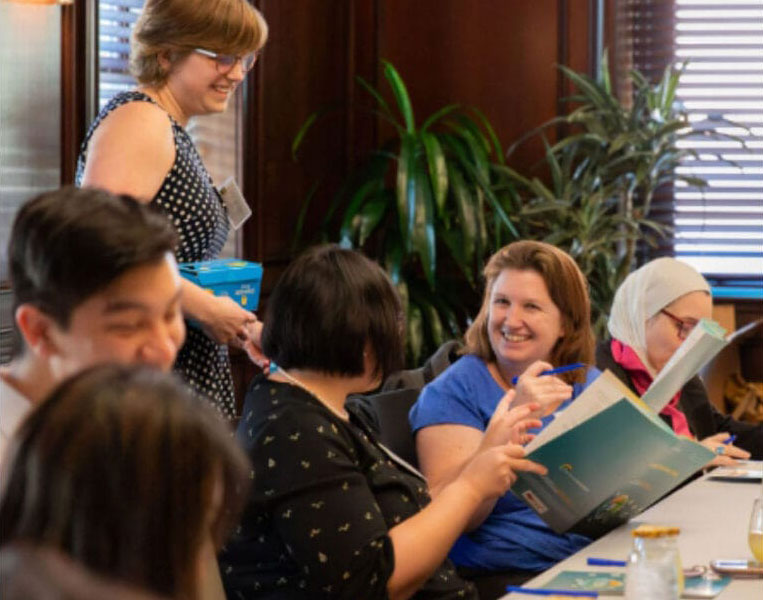Lead the way to a sustainable future.
The Rob and Melani Walton Sustainability Teachers Academy provides educators with the knowledge and resources to bring sustainability science into any K-12 classroom. Our approach leverages the expertise of education professionals from across the country to cultivate a community of sustainability changemakers. Together, we are developing innovative strategies to address economic, social and environmental challenges.
Our professional development opportunities integrate research conducted by professionals, scientists and scholars from Arizona State University’s Rob Walton College of Global Futures. We have translated this research into effective practices that teachers can use to evaluate and address the most relevant problems facing their schools or communities. We promote researcher-practitioner partnerships, learning communities and project-based opportunities to position our participating teachers, students and others as change agents to create a more sustainable future.
The Rob and Melani Walton Sustainability Teachers Academy was established in 2015 by an investment from the Rob and Melani Walton Foundation.
Sustainability Teachers Academy
As educators, you inspire your students to change the world.
Now, you can give them the tools they need to make a difference. Our no-cost, 2-hour professional development experience is designed to help educators integrate sustainability into any course.
Learn practical strategies, engage with classroom examples and launch real student projects through the Walton Sustainability Teachers Academy introductory course.
Our programs
Since its inception in 2015, The Rob and Melani Walton Sustainability Teachers Academy has provided teacher professional development opportunities to more than 3,000 educators across the United States. WSTA has established more than 50 partnerships with school districts, nonprofit organizations and local governments to support projects that seek to improve local sustainability efforts. WSTA has grown to include three main programs:

Walton Sustainability Teachers Academy
Our flagship program has long served as a foundational professional development opportunity for educators eager to incorporate sustainability topics into their existing curriculum. It is currently offered as an online, asynchronous program for teachers of all grade levels.

Sustainability Learning Labs
Our Sustainability Learning Labs were developed as a platform for local educators to engage with and implement sustainable practices in classrooms and communities alike. We currently manage eight Learning Labs across the country, including Canopy for Kids and the Storm Smart Schools Learning Lab.

Fellowship programs
Our fellowship programs originally launched in 2022. They provide valuable opportunities for educators to build professional connections, enhance their skills and contribute directly to the sustainability field while gaining hands-on experience.
Resources
Teacher resources
Browse our carefully curated library of resources, providing teachers with curriculum guidance spanning a diverse range of topics.
Research and reports
Our programs are based on use-inspired research in sustainability education and effective professional development strategies.
Get connected
Fill out our contact form with questions, partnership inquiries or to subscribe to our biannual newsletter.
Sustainability Teachers Academy staff
in the news
Planting for the future: ASU helps elementary students design cooler Phoenix schools
Canopy for Kids brings much-needed shade trees to campuses, making students part of the design process.
Read on news.asu.eduASU employees earn recognition for their work on real-world solutions
From a library that can be accessed anywhere in the world to an AI tool that analyzes speech to determine brain health…
Read on news.asu.eduPC’s Sustainability and Climate Action Network transforms storm drainage area with trees and plants
On Wednesday, February 12, Phoenix College’s Sustainability and Climate Action Network (PC-SCAN) hosted a storm…
Read on phoenixcollege.eduWater literacy in the desert: Aligning education with Arizona’s water future
Every drop of water holds immense value in Arizona, and the need for increasing water literacy continues to grow. The team…
Read on azwaterinnovation.asu.eduWalton sustainability program empowers K-12 educators to combat food waste
Food waste is one of the most pressing issues of our time, affecting the environment and economies worldwide…
Read on news.asu.eduWe conducted a food waste audit at my school; this is what I learned
My name is Rogue, and I’m thrilled to have this opportunity to introduce myself and my passions in this essay. I’m…
Read on worldwildlife.orgSeeking to scale, ASU’s Sustainability Teachers Academy goes online
For a decade, Arizona State University’s Sustainability Teachers Academy, part of Lifelong Learning in the…
Read on news.asu.eduBuild a rain garden: Nature-based solutions from schools for your home
Living in the desert in Arizona, we are no strangers to extreme heat and sparse rainfall. As temperatures rise, so do health concerns…
Read on wateruseitwisely.comFrom engagement to action: How teachers are shaping the future of water literacy in Arizona
On February 8, 2025, in collaboration with ASU Walton Sustainability Teachers Academy, we brought together 26 skilled educators from…
Read on azwaterinnovation.asu.eduThe Mill Food Recycler as a teaching tool
How Mill partnered with World Wildlife Fund and Arizona University to develop the Food Waste Futures Fellowship program in Phoenix…
Read on mill.comThe ASU Sustainability Teachers Academies were founded through a generous investment from the Rob and Melani Walton Foundation.